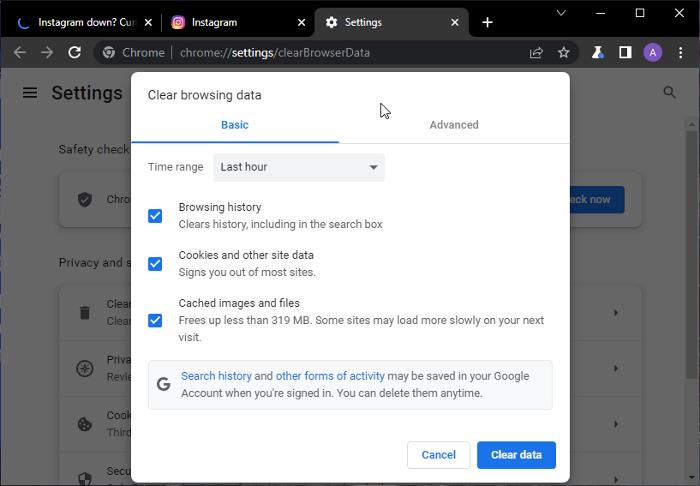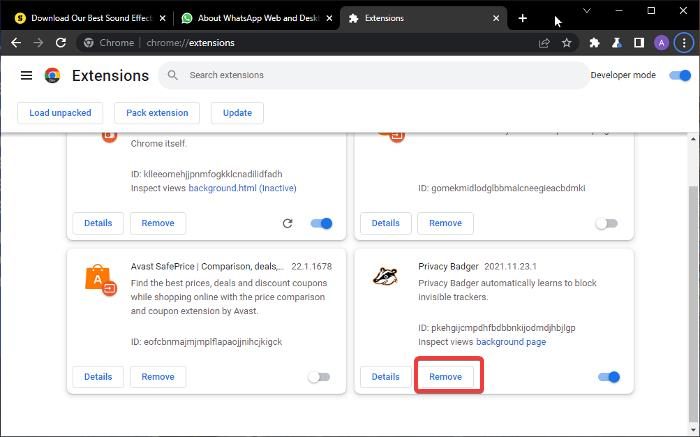Are you getting the “Invalid URL” error on Google Chrome? URL (Uniform Resource Locator) is the address of a web page on the internet. A lot of Chrome users have complained of experiencing the “invalid URL” error when visiting some web pages. The full error message which is displayed is as follows:
The page you were on is trying to send you to an invalid URL. If you do not want to visit that page, you can return to the previous page.

This error is likely to be triggered when the URL is not correct, you have mistyped the URL or if you are dealing with corrupted browsing data (cache, cookies, etc.).
What does URL Invalid mean?
An invalid URL basically means that the URL you have entered has typing mistakes or contains spaces or symbols. An invalid URL might also mean that the web page is deleted or moved to some other URL. If you are getting the “invalid URL” error in Chrome, make sure the URL you have entered is correct. If you have entered the exact URL, use the fixes we have mentioned in this post to fix the error.
It might also occur when a scammer is abusing Google Search’s open redirect feature. Using this way, scammers try to trick users into revealing their login credentials. You may come across phishing URLs that surprisingly look trustworthy at first. These URLs point to Google. However, a brief inspection of these URLs reveal they append Google search’s open redirect HTTP parameter. This way, scammers try to redirect users to malicious, phishing websites.
How to fix Invalid URL error on Google Chrome
If you receive the error message The page you were on is trying to send you to an invalid URL on Google Chrome, you can use the below fixes to resolve the error:
- Start with basic fixes.
- Log out of your Google account.
- Delete the browser cache and cookies.
- Disable or remove browser extension.
- Make sure you have the required access permissions to view the web page.
- Reset or Reinstall Chrome.
- Switch to a different web browser like Edge, Firefox, etc.
Before you proceed, first check if the URL you typed is correct and if the URL you are being redirected to is legit as it could be a Phishing attempt as explained above.
1] Start with basic fixes
Here are some standard practices that you can use to fix the error:
- Try reloading the webpage a couple of times and see if the error is fixed.
- Restart Google Chrome and then try visiting the webpage returning the invalid URL error.
- Reboot your computer and then open Chrome to check if this error occurs when trying to visit the same webpage.
- Check the URL of the webpage you are trying to open and make sure it is correct.
- Make sure that the webpage you trying to visit exists and is not deleted or removed.
Read: Fix STATUS INVALID IMAGE HASH error on Google Chrome or Microsoft Edge.
2] Log out of your Google account
The next thing you can do is sign out of your Google account from Chrome and then restart your web browser. On the next startup, login back to your account and then visit the web page giving your “invalid URL” error. There might be some temporary glitch with your profile causing the error at hand. So, in that case, this method should work for you.
You can also use another Google account to log in to Chrome and check if the error is resolved or not. Or, you can create a new Google account and sign in with that account to see whether or not the “invalid URL” error is fixed or not.
See: Fix HTTP ERROR 431 in Google Chrome.
3] Delete the browser cache and cookies

It is very much possible that corrupted and bad browsing data including cache and cookies are causing the error at hand. Old and bulked-up browsing data trigger errors and issues while visiting a website or using an online tool. Hence, it is recommended to clear your browser cache and cooked once in a while to avoid issues like this.
Here are the steps to clear cache and cookies in the Google Chrome browser:
- First, open Google Chrome, and then from the top-right corner, tap on the three-dot menu button.
- From the appeared menu option, go to More tools and select the Clear browsing data option.
- A Clear browsing data dialog window will appear; choose the Time range as All time.
- After that, checkmark the options called Cookies and other site data and Cached images and files. If you want to clear the browsing history, download history, and other browsing data, you can do that too.
- Next, click on the Clear data button and Chrome will clear the selected data from your web browser.
- When the process is complete, reopen Google Chrome and try visiting the previous web page that was giving you the “invalid URL” error.
Read: How to fix File Download Errors on Google Chrome browser?
4] Disable or remove browser extension

There might be some problematic or suspicious extensions that you have installed in your browser causing the error at hand. If you started experiencing this error after adding an extension recently, the main culprit might be the extension. Hence, if the scenario is applicable, you can disable or remove your browser extensions to fix the error at hand. Here’s how to do that:
- Firstly, go to Google Chrome and click on the three-dot menu button that is present in the top-right corner.
- Now, click on the More tools option and then select the Extensions option. It will open up the Extensions page where you can access all your installed web extensions.
- After that, look for a problematic extension and disable the toggle associated with it.
- If you want to uninstall the extension from your browser, tap on the Remove button and click on the Remove button on the next confirmation prompt.
- When done, relaunch Google Chrome and check if the error is resolved or not.
See: Fix ERR_CONNECTION_RESET error on Chrome browser.
5] Make sure you have the required access permissions to view the web page
It might be the case that you don’t have the required access permission to view the web page and thus, you are getting the “invalid URL” error. This is most likely to happen when visiting forms, surveys, or web pages for work-related tasks. Hence, you need to ensure that you have the required access permission for the web page you are trying to visit in Google Chrome.
Read: Stop unwanted websites opening automatically on startup
6] Reset or Reinstall Google Chrome
The error message “The page you were on is trying to send you to an invalid URL” in Chrome might occur if there are corrupted installation files. Hence, you can try reinstalling Google Chrome to fix the error at hand. For that, you will need to uninstall the browser first. But, make sure to turn on the data syncing option if you don’t want to lose data saved on your profile.
To uninstall Google Chrome, open Settings using Win+I and go to Apps > Installed apps. Now, scroll down to the Google Chrome app and tap on the three-dot menu button. Then, select the Uninstall option and follow the prompted instructions to remove the browser from your PC. Once done, download the latest version of Google Chrome online and install it on your PC. Hopefully, you won’t experience the same error again.
Read: The proxy server is refusing connections error in Chrome or Firefox.
7] Switch to a different web browser like Edge, Firefox, etc.
If none of the above solutions worked for you, switch to a different web browser to open the problematic web pages. There are several free web browsers available for Windows 11/10. You can use the default web browser of Windows i.e., Microsoft Edge. Or, you can try Mozilla Firefox, Opera, and various other web browsers. Hopefully, this workaround will fix the error for you.
Read: Precautions to take before clicking on web links
Why is URL not opening in Chrome?
If a web page is not loading or opening in Google Chrome, there might be an internet connectivity issue at your end. Apart from that, corrupted and outdated cache and cookies can be a reason why you are unable to load certain web pages in Chrome. The problem might also occur if you are using an outdated version of the browser or its installation is corrupted.
How do I fix invalid URL in Chrome?
To fix the “Invalid” in Google Chrome, delete the web browser cache and cookies. Also, try disabling or removing problematic web extensions from your browser. If that doesn’t work, update Google Chrome and reinstall the web browser to fix the error. We have mentioned all these working fixes in detail, so check them out.
Now read: Not enough memory to open this page – Google Chrome error.